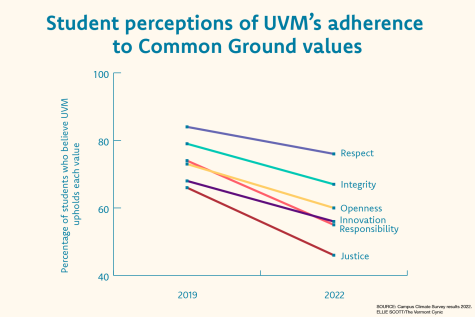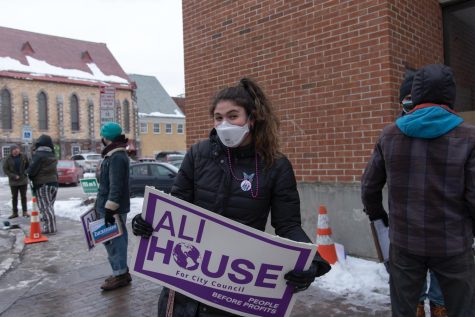UVM alum slated to be first woman of color in Vermont State Senate
Kesha Ram, pictured in Randolph, VT, won her democratic primary Aug. 11 and will face other candidates in the general election this November.
September 8, 2020
As the first person of color from Burlington in the state legislature and at one time the youngest legislator in the country, Kesha Ram has never been afraid of ambition.
The UVM and Harvard alum is set to be the first woman of color in the Vermont State Senate and has broken numerous barriers throughout her career as a social scientist, legislator, equity consultant and leader.
In the race for a State Senate seat to represent Chittenden county, Ram received 20,171 votes, second only to current Chittenden County Senator Virginia Lyons with 21,187 votes, according to the Vermont Secretary of State.
Ram, along with five other Democratic candidates, will face off in the November general election she must win in order to secure her post.
Ram’s platform is focused on championing affordable homeownership, green job creation, paid family leave and the expansion of early and higher education opportunities, according to her website.
Ambitious from a young age, Ram’s political journey started in the 5th grade.
The daughter of an Indian immigrant father and Jewish American mother, she was first elected as Student Body President of her elementary school in Los Angeles.
“I would write speeches on note cards and go to the school board and I would talk about violence around the school and kids who might be going hungry,” Ram said. “They weren’t getting an update from the student council president about t-shirts or something.”
I want young people to look at what they’re capable of and to try and fail, sometimes. But to fail in a safe way where we can pick it back up and move the ball down the court.”
— Kesha Ram
Ram graduated from UVM with a Bachelor’s of Science in Natural Resources Planning and a Bachelor’s of Arts in Political Science. While in school, she was a member of Slade, a student-run ecological cooperative.
Although an activist on campus, she did not envision running for political office.
“We didn’t think Washington was the place where you got things done,” Ram said.
As then-President of the UVM Student Government Association, she was encouraged to run for office by Bernie Sanders and Barack Obama in 2006.
Ram was elected to the Vermont House of Representatives in 2008, becoming the first person of color in state history to represent Burlington.
“I want young people to look at what they’re capable of and to try and to fail, sometimes,” Ram said. “But to fail in a safe way where we can pick it back up and move the ball down the court.”
Outside of her role as both a young, female legislator and an equity and inclusion consultant, she has had to confront the notion that she is too ambitious.
“My driving force is in making people feel welcome,” Ram said. “But changes are coming in this country and Vermont is on the tail end of demographic shifts of figuring out what the next generation will look like and what demands they will have.”
Ram said she believes Vermont should be a state that treats people the way we want to be treated.
“That is our future workforce,” she said. “We have to be the state that treats people the way we want to be treated.”
With a Bachelor’s of Science degree, Ram will represent one of two women elected to the State Senate with a technical science background.
She said her educational background was a good source of training that continues to help her make data-informed decisions.
“Data tells stories and stories give you data,” Ram said. “I tend to be a dichotomous thinker in terms of being very data-driven and very emotional and oriented towards storytelling.”
Ram’s senior thesis at UVM focused on environmental health in Vermont.
In the years following her graduation from UVM, she has advocated for more effective data collection accounting for demographic differences across the state.
Recently, this initiative has helped to identify how to best distribute resources in the pandemic.
“We saw huge disparities in infection rates for black Vermonter and for new Americans,” Ram said of the COVID-19 pandemic.
In the coming fall and in the face of an ongoing pandemic, Ram says she will focus on continuing to support all members of her community.
“This pandemic leaves a lot of people out who aren’t on Facebook or on Zoom so whether on the phone or in an appropriately-distanced setting, my goal is to hear from people,” she said. “If you ask me a question, I will get you an answer.”

















